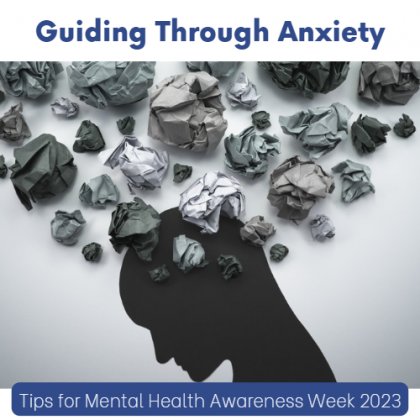By Jun Kit Man, Digital Media Manager
As Mental Health Awareness Week 2023 commences, we are reminded of the vital role our emotional well-being plays in our lives and the importance of uplifting those around us. This yearly observance seeks to dismantle the stigma associated with mental health challenges, foster open and honest conversations, and offer essential resources to individuals and communities alike.
The theme of this year's Mental Health Awareness Week is "Anxiety". While anxiety is a natural part of our emotional spectrum, it can spiral out of control and develop into a debilitating mental health concern for some individuals. By focusing on anxiety this year, we hope to raise awareness and understanding of this complex condition and provide practical insights on strategies to prevent it from becoming a pervasive issue.
Mind UK estimates 1 in 6 people report experiencing a common mental health problem (like anxiety and depression) in any given week in England, and many more deal with other anxiety-related conditions. As we raise awareness this week, it's essential to understand that supporting someone with anxiety can be a challenging but profoundly impactful journey.
Education and Understanding
Understanding anxiety is fundamental to supporting someone battling this condition. Beyond occasional worry or stress, anxiety disorders can manifest as persistent, overwhelming feelings of apprehension that significantly disrupt daily life (NHS, 2021). People with anxiety often describe it as having a constant feeling of dread that something bad is about to happen. Educating yourself about the nuances of anxiety will help you provide empathetic and effective support. You can access resources from Mind, Anxiety UK, and the NHS to enrich your understanding.
Patience and Compassion
Patience and compassion go a long way when supporting someone with anxiety. Progress may not always be linear, and setbacks can occur. Recognise that managing anxiety is a process, and rushing it can be counterproductive.
Active Listening
Active listening isn't just about hearing words; it's about understanding the emotions behind those words. It involves giving the person your undivided attention, reflecting back your understanding of what they've shared, and providing non-judgemental responses. By actively listening, you can make the person feel seen, heard, and less alone in their struggle.
Validation of Feelings
Validation is a powerful tool that helps people feel acknowledged and understood. When supporting someone with anxiety, strive to validate their feelings instead of dismissing them or offering immediate solutions. Reiterate that their feelings are real and legitimate, even if you may not fully understand what they're going through. Remember, as Mind emphasises, validation can play a crucial role in managing mental health (Mind, 2021).
Encourage Professional Help
If anxiety is causing significant disruption to the person's life, they may benefit from professional help. Therapists and psychologists can provide expert guidance and treatment options, such as Cognitive Behavioural Therapy (CBT) and other forms of talking therapy. Anxiety UK, a charity providing support for those with anxiety, offers a range of resources and reduced-cost therapy options. Samaritans, another UK-based organisation, provides a helpline that's available 24/7 for anyone in need of emotional support.
Support with Coping Strategies
While it's essential for the individual to find their own coping strategies, you can help by suggesting various techniques. Mindfulness, deep breathing exercises, and regular physical activity have all shown efficacy in managing anxiety. You might also recommend digital resources like Headspace and Calm, which offer guided meditations and mindfulness exercises. Remember, though, to be respectful and understand that each person has to find what works best for them.
Assistance with Daily Tasks
At times of heightened anxiety, everyday tasks can feel overwhelming. If appropriate, offering help—be it with grocery shopping, cooking, or childcare—can alleviate some of the pressure. Keep in mind that the goal is to empower the person to manage their anxiety, so this assistance should be provided in a way that promotes independence rather than dependency.
Maintaining a Positive Attitude
Maintaining a positive attitude doesn't mean downplaying the seriousness of the situation, but offering a perspective of hope and positivity. Celebrate even small victories, such as when they manage to carry out a task that anxiety previously made difficult. During setbacks, provide reassurance and remind them that recovery is a process, and it's okay to have bad days.
As Mental Health Awareness Week shines a spotlight on anxiety this year, it's essential to remember that each person's experience with anxiety is unique. What works for one person might not work for another. The key is patience, understanding, and flexibility. With a deeper understanding, practical strategies, and a supportive attitude, you can provide invaluable help to someone navigating the complexities of anxiety.
At Civil Service College, we believe in empowering our civil servants with the tools they need to thrive in their professional and personal lives. As part of our commitment to building a more resilient and emotionally intelligent civil service, we proudly offer a range of Wellness and Resilience programmes designed to create healthier, happier, and more effective work environments.
Our programmes tackle some of the most pressing issues in today's professional landscape, with a strong emphasis on mental health. In our "Normalising Emotional and Mental Health in the Workplace" course, we work towards dismantling the stigmas surrounding mental health and foster an open, empathetic conversation about emotional well-being in a professional setting.
Our "Mental Health Awareness" programme provides crucial insights into recognising, understanding, and supporting mental health challenges amongst colleagues. This training not only equips civil servants with the skills to support their peers but also encourages them to prioritise their own mental health.
Finally, our "Design Your Work-Life: Positive Habits for a Better Balance" programme is dedicated to helping civil servants strike the perfect balance between their professional duties and personal lives. We delve into strategies for stress management, productivity, and wellness, fostering habits that lead to a more fulfilling, balanced lifestyle.

